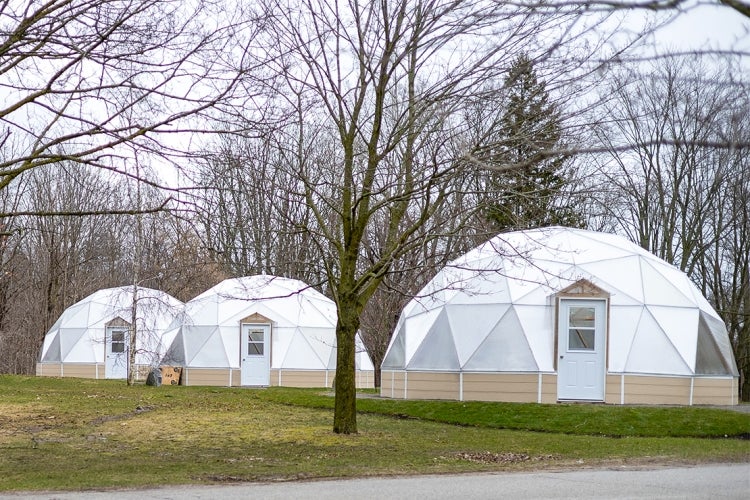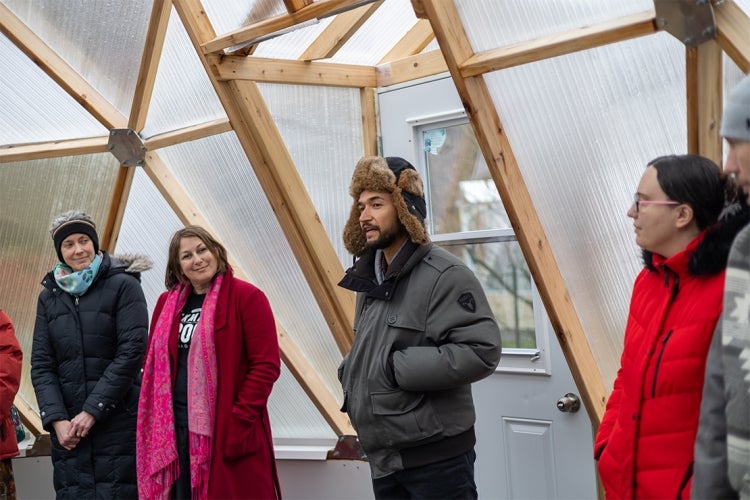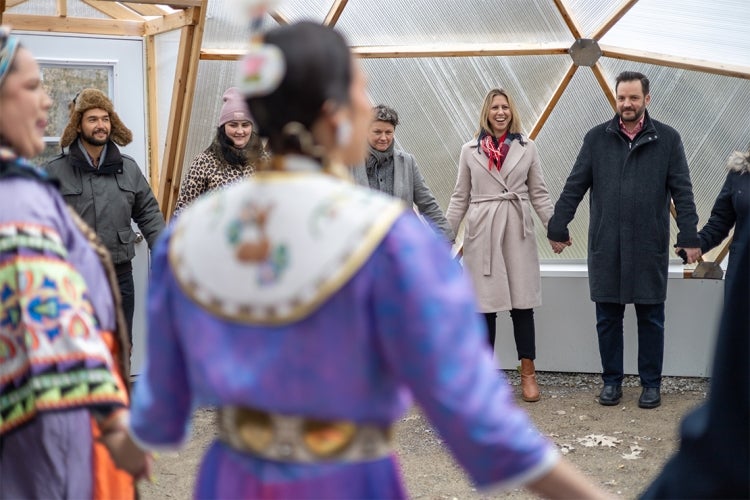They may look like giant golf balls, but the four 24-foot domes by the University of Toronto Scarborough tennis courts are in fact high-tech greenhouses equipped with solar panels, irrigation systems and geothermal tubes than run deep underground.
The domes were constructed as part of the Indigenous Entrepreneurship and Garden Project, an initiative that aims to offer a hands-on complement to the Indigenous Entrepreneurship Workshops, which begin this September and are designed to help students and community members connect Indigenous knowledge, community and entrepreneurship.
The workshops were co-created - and will be taught - by Jonathon Araujo Redbird, a business leader from Saugeen First Nation who runs Redbird Circle Inc., a company specializing in entrepreneurship training based on Indigenous knowledges and values. They're being offered in partnership with U of T Scarborough's The BRIDGE and U of T Mississauga's ICUBE accelerators.
"We want Indigenous youth to come here and make it their second home and learn about the land, how to grow produce from the land and how we can learn entrepreneurship through that process," says Redbird, who co-founded Redbird Circle with Christina Tachtampa.

Redbird Circle first partnered with ICUBE in 2021 to offer the Indigenous Entrepreneurship Program. The company then collaborated with the Indigenous Network non-profit to bring the idea of a garden project to life, with the help of a grant from the Canada Community Revitalization Fund.
The series comprises a free, virtual 12-week program modelled on the medicine wheel - an Indigenous symbol of balance between physical, mental, emotional and spiritual well-being.
The medicine wheel also inspired the themes for the domes, which are interconnected and will stay at a humid 35 degrees C year-round.
The first dome will be dedicated to growing crops that support wellness, while the second will be used to test ways to rejuvenate soil without using chemicals. The third dome will be used to teach entrepreneurship through crops and to find ways to turn produce into high-yield sources of income for Indigenous people and communities.
Finally, dome four will be devoted to experimenting with agriculture technologies, starting with vertical farming equipment made by U of T startup Just Vertical.
All four domes will be accessible for people using mobility devices and entirely self-sustaining when construction finishes in the coming months.

Redbird, who grew up in the Gabriel Dumont housing complex in Scarborough, says he has experienced how difficult it can be for Indigenous people to stay connected to the land on urban reserves. He adds Indigenous people face an added obstacle to building intergenerational wealth in the form of the Indian Act, which he says makes it challenging to borrow money and impossible to trade land with people outside their communities.
"If Indigenous people want to build intergenerational wealth, the only way to do that is to leave our traditional lands and come to the cities," he says. "And when we do come to the cities, the prices are very high to purchase a home."
But Redbird says entrepreneurial thinking can play a role in empowering Indigenous people, with agriculture providing one important avenue.
While the workshop series is designed for Indigenous learners, it is open to anyone interested in traditional Indigenous knowledge and entrepreneurship, with community members encouraged to share their thoughts on how they envision the domes' layouts and uses.

"This is a space that's very much been created and will continue to be improved upon through that consultative approach and listening to community feedback," says Arjuna Thaskaran, industry partnerships, innovation and work-integrated learning lead at The BRIDGE. "It's about having the community take ownership of the space and drive how they want to shape it."
Various academic departments have expressed interest in collaborating on the program. "There are discussions with several programs about Indigenizing some of the current projects and curriculum, and learning about sustainability through Indigenous approaches to urban agriculture," says Dave Fenton, assistant director of external relations in U of T Scarborough's department of management.






